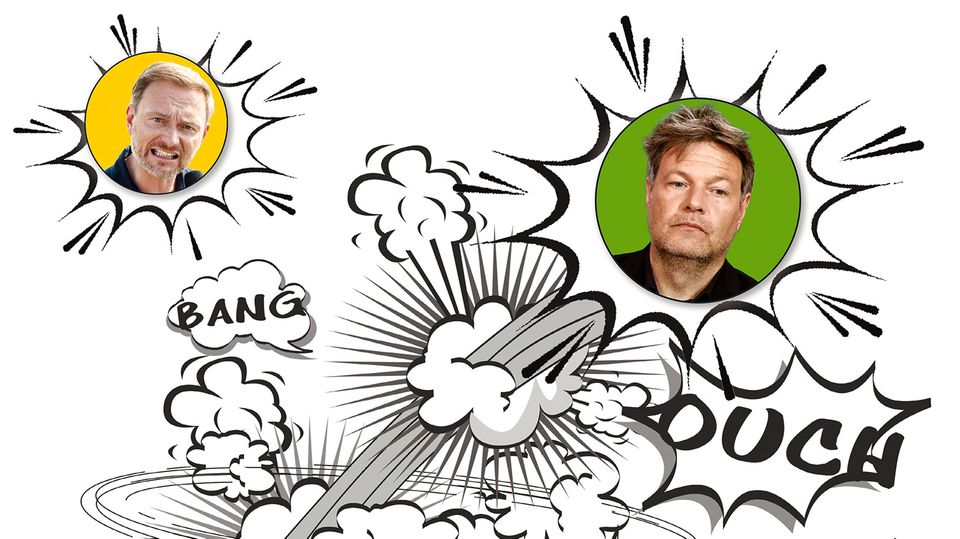Opinion
ARD Germany trend
The rise of the AfD: The fear of the party rules
According to the ARD Germany trend, the AfD is on par with the SPD at 18 percent
© Kay Nietfeld
The right-wing populists reach 18 percent nationwide and draw level with the chancellor party SPD. It’s not the heat pumps that promote this mood. It is the government’s lack of charisma as a whole that is not only damaging to itself, but also to democracy.
That has never happened before: the AfD is now 18 percent in nationwide polls – ahead of the FDP and Greens, on a par with the SPD. In other words, right-wing populists could enter parliament as the second strongest force if there were a federal election on Sunday. Even after the new electoral law, that would probably mean well over 100 MPs. And it’s only a few percentage points to the union.
Well, what do you say to that now? Where, please, is the catalog with the usual answers? Oh yes, here: not pretty, but just a snapshot. Polls are not elections. Must worry us, but it’s the others’ fault. Politicians can no longer argue, they must deliver. The AfD has no concepts, just a bad mood. The strength of the AfD is above all the weakness of the established parties.
Is this enough? Have a nice weekend!
The problem with the AfD is less in the 18 percent this week. It is in their continuity over the past few years. The AfD has argued and clamored, it has split and dismantled, it has become more and more right-wing and uninhibited. And yet she is still there.
The AfD never came to power, but it changed politics. The fear of her now reigns too.
The problem with the AfD is not upward rashes in individual polls, the problem is their creeping forward movement – yes, where to? To power? Can Björn Höcke become prime minister? Unlikely, but can no longer be ruled out. Could Tino Chrupalla become chancellor? Well, now for a moment. Or does it?
The AfD sympathizers are disappointed with the traffic light
That’s the problem: over the years, the AfD has always done a little more than you would have given it credit for. Founded as an event for old men against the euro, it failed to pass the five percent hurdle in the 2013 federal election. Phew, lucky, the Germans are reasonable, historical lesson learned, topic settled. In 2017 she made it into parliament and gradually into many state parliaments.
The AfD is particularly strong in the east. In Saxony-Anhalt, Prime Minister Reiner Haseloff benefited in 2021 from the fear of a victory for the AfD, which also drove voters from other parties to his CDU. Will such a community succeed again in Thuringia, Brandenburg and Saxony in 2024? Or does the AfD do a little more than what you give it credit for?
The so-called tipping points are known from the debate about global warming. They are stations in a process after which certain developments can no longer be reversed, errors and omissions can no longer be corrected. The tipping point at which the AfD no longer disappears from the political landscape has already been passed. What’s next?
There is nothing wrong, of course, in asking the government to stop arguing and do a decent job. But it is also true: war, inflation, industrial structural change, energy supply – big problems also require big solutions. And great solutions must be struggled for. This is not about decisions only until the day after tomorrow, but for decades.
Democracy is the best political system to find these solutions. The traffic light even proved that democracies can also be fast. But she didn’t get any motivation from it, only mutual frustration. The Scholz government mastered the energy crisis in 2022, but nothing came of it in common – in the meantime, demolition has dominated instead of new beginnings. The traffic light coalition, which might have had what it takes to achieve great things, seems too fragmented and not serious enough. It seems as if she only argues for the sake of the argument, but not for the sake of the matter. It doesn’t advertise itself, but it doesn’t advertise democracy either. She does not pursue her search for progress with self-confidence and aspirations, but with envy and resentment.
67 percent of AfD sympathizers say their motive is disappointment with the government. This cannot only be due to heat pumps. The coalition lacks radiance. It does not arouse the confidence that the chancellor, in particular, is constantly talking about. SPD, Greens and FDP do not succeed in conducting their debates really constructively, they just call it that. But that also discredits democracy itself. She loses respect. The AfD also leads to 18 percent.



